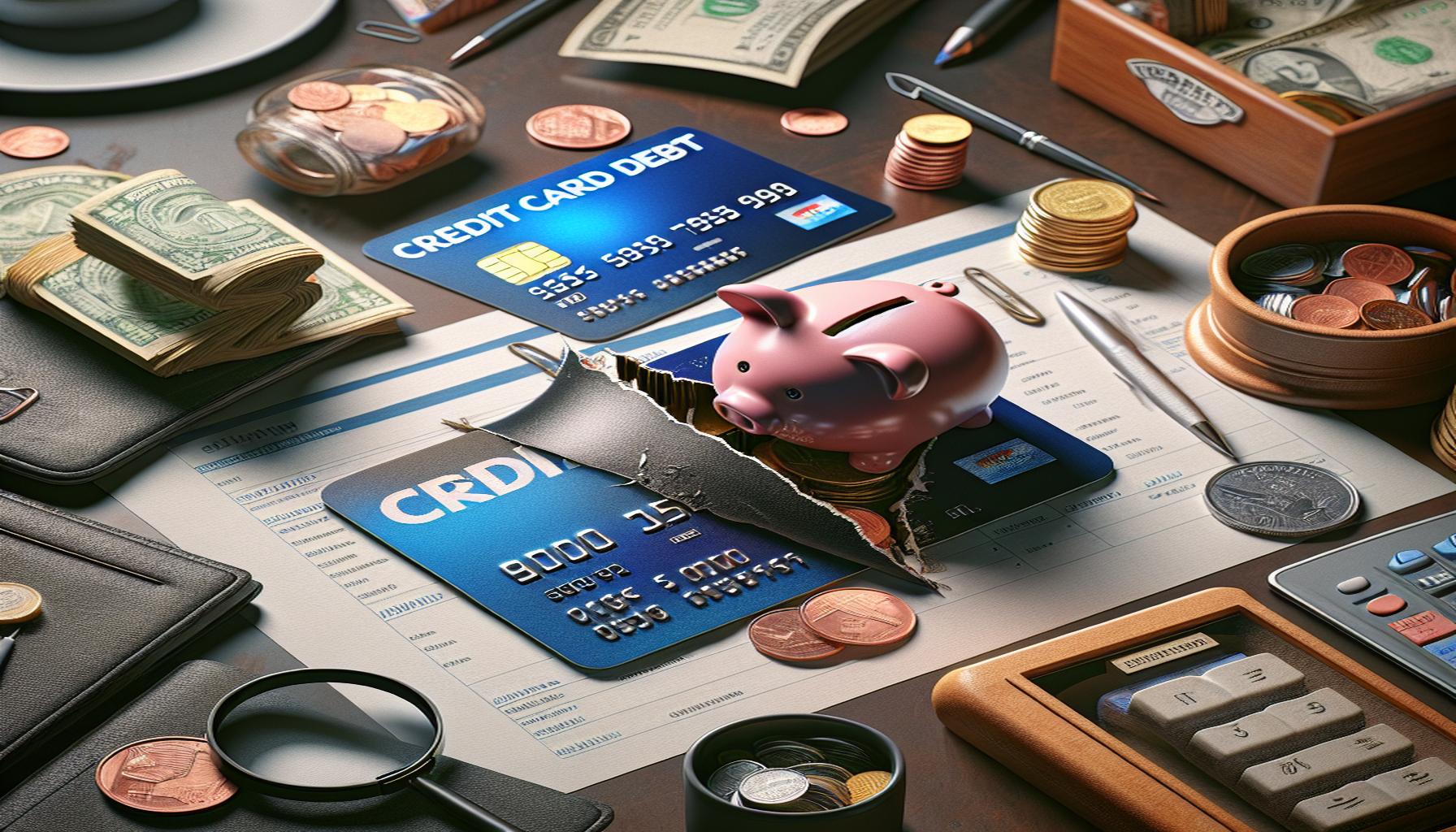Tips to Avoid Credit Card Debt

Understanding Credit Card Debt
Credit card debt can sneak up on anyone, transforming what seems like a handy financial tool into a heavy burden. A credit card can provide convenience and rewards, but without careful management, it can lead to overwhelming debt. By practising smart spending habits, you can enjoy the benefits of credit without falling into the trap of debt.
Here are some key strategies to help you stay on track:
- Create a Budget: Outlining your income and necessary expenses is vital to understanding your financial situation. Start by listing all sources of income, then detail your essential monthly expenses, such as rent or mortgage, utilities, groceries, and transport. Once you’ve established your baseline expenses, you can allocate a portion of your budget for discretionary spending, including credit card use. For instance, if your monthly take-home pay is $3,000, and your essential expenses amount to $2,200, you could comfortably set aside $300 for credit card purchases, focusing specifically on consolidating your debt or managing essential needs.
- Pay on Time: One of the simplest yet most effective ways to avoid falling into the credit card debt trap is by ensuring that you always pay your bill by the due date. Late payments not only incur hefty fees but can also lead to an increase in interest rates, compounding your financial woes. Set reminders on your phone or schedule payments in advance through your bank to ensure you never miss a due date. Using direct debit can also help manage this process, enabling automatic monthly payments from your bank account.
- Limit Your Credit Card Use: Another effective strategy is to restrict your credit card usage to essential purchases or emergencies. Instead of relying on your credit card for everyday expenses such as dining out or shopping for non-essentials, consider building a savings buffer for these types of expenditures. For example, if you know you have a birthday coming up, set aside a small amount each week in advance rather than charging it to your credit card at the last minute.
Understanding how to use credit wisely is crucial for protecting your financial health and maintaining your peace of mind. Building and sticking to a budget can help you gain control over your expenses, while timely bill payments can prevent unnecessary fees and mounting interest. Remember, even small changes in your habits can lead to significant savings and improved credit health over time. Being aware of your spending patterns and making informed decisions about when and how to use your credit card will ultimately empower you to enjoy the benefits of credit without the burden of debt.
Smart Spending Habits
Establishing smart spending habits is one of the cornerstones of avoiding credit card debt. Being mindful of how and when you use your credit card is essential to maintaining financial stability. Below are some effective habits that can help you manage your credit usage responsibly:
- Track Your Spending: Keeping an eye on your monthly spending is vital for making informed decisions. Consider using budgeting apps available in Australia that can sync with your bank accounts to monitor your expenses in real time. By regularly checking your expenditures, you can quickly identify areas where you may be overspending. For example, if you notice that a significant portion of your budget is going towards takeout meals, you might decide to cook at home more often, thus saving money and reducing credit card reliance.
- Use Cash for Everyday Purchases: By using cash for small, day-to-day expenses, you can avoid racking up charges on your credit card. Try withdrawing a set amount of cash for the week and use this money for discretionary spending like groceries or entertainment. Once that cash is gone, you will be less likely to overspend and will stay within your financial limits. This method can help you develop a better understanding of your spending habits and provide an immediate visual cue on your remaining budget.
- Avoid Impulse Purchases: Impulse buying can often lead to regret and destabilise your financial plan. To curb this habit, create a ‘cooling-off’ period for non-essential purchases. For instance, if you see something you want to buy, wait 24 hours before making the purchase. This waiting period allows you to assess whether it’s truly necessary and if it fits within your budget. Many Australians find that this simple step helps them distinguish between wants and needs, leading to healthier spending decisions.
- Understand Your Credit Card Terms: Familiarising yourself with the terms and conditions of your credit card—such as interest rates, reward programs, and fee structures—is crucial to avoid surprises. For example, some cards may offer attractive rewards but come with high annual fees that can offset any benefits. By understanding these details, you can choose the right card for your spending habits and minimise unnecessary costs.
Applying these smart spending habits can help keep your credit card use in check, allowing you to enjoy its benefits without slipping into debt. By actively monitoring your expenses, using cash for everyday purchases, avoiding impulse buys, and understanding your credit card terms, you will lay a solid foundation for effective financial management. It’s important to remember that financial security takes time and effort, but every small change you make can contribute to a brighter financial future.
Establishing a Budget
Creating and maintaining a budget is a fundamental step in avoiding credit card debt. A well-thought-out budget allows you to allocate your income to essential expenses while setting limits on discretionary spending. Here are some practical tips on how to effectively budget your finances:
- Set Clear Financial Goals: Identify both short-term and long-term financial objectives, such as saving for a holiday or paying off student loans. These goals will guide your budgeting efforts and provide motivation to stick to your spending limits. For instance, if you’re saving for a trip to Bali, you might decide to allocate a certain percentage of your income each month specifically towards that goal, which can help you avoid unnecessary credit card usage.
- Utilise the 50/30/20 Rule: One popular rule of thumb for budgeting is the 50/30/20 method. This approach suggests allocating 50% of your income to necessities, 30% to discretionary spending, and 20% to savings or debt repayment. By adhering to this structure, you can ensure that you are not overspending in any one category while still making progress towards reducing any existing debt you may have.
- Review and Adjust Your Budget Regularly: Your financial situation may change, requiring you to adjust your budget accordingly. Life events such as a new job, relocation, or unexpected expenses can impact your budgeting. Schedule regular check-ins—perhaps once a month—to evaluate your spending patterns, assess your financial goals, and make any necessary adjustments. By remaining flexible, you can avoid surprises that may lead to reliance on credit cards.
- Limit Access to Credit: To reduce the temptation of overspending, consider limiting the access you have to credit. One practical method is to leave your credit card at home when going out. This simple decision can help you stay committed to using only cash or debit for your purchases. Additionally, if you find that a specific credit card encourages unplanned spending due to its availability, you may want to consider keeping it in a secure place at home instead of in your wallet.
Incorporating these budgeting techniques into your financial routine will support your overall efforts to avoid credit card debt. By setting clear goals, following the 50/30/20 rule, regularly reviewing your financial status, and limiting credit accessibility, you can stay in control of your finances and reduce the anxiety associated with debt. Budgets are not just about restriction; they are powerful tools that can lead to financial freedom and peace of mind.
Building an Emergency Fund
Another crucial aspect of financial health is having an emergency fund. This fund acts as a safety net that can protect you from unexpected expenses and prevent you from turning to credit cards in times of need. Consider the following strategies for establishing a robust emergency fund:
- Determine Your Target Amount: A commonly recommended goal for an emergency fund is to save between three to six months of living expenses. This range can give you a comfortable cushion to cover unexpected situations such as medical emergencies, job loss, or urgent car repairs without resorting to credit cards.
- Start Small: If saving several months’ worth of expenses seems daunting, start small. Aim to save a specific amount each week or month, even if it’s a modest contribution. Setting up an automatic transfer to a designated savings account can make this process easier and more consistent. For example, if you find yourself with a little extra cash at the end of each pay period, consider transferring that amount directly into your emergency fund.
- Keep Your Emergency Fund Separate: To avoid the temptation to dip into your emergency fund for non-emergencies, consider keeping it in a separate savings account. This way, the money is accessible when needed but not readily available for impulsive spending.
- Replenish the Fund After Use: If you ever need to utilise your emergency fund, make it a priority to rebuild it as soon as possible. This commitment to re-establishing your financial safety net will ensure that you’re prepared for future emergencies without falling back on credit.
By focusing on building an emergency fund, you’ll equip yourself with a valuable financial resource that can help you navigate unforeseen challenges. The peace of mind that comes from knowing you can manage unexpected costs without relying on credit cards will further enhance your overall financial well-being.
Conclusion
In conclusion, avoiding credit card debt requires a proactive and strategic approach to managing your finances. By establishing a budget and sticking to it, you not only gain control over your spending but also foster a sense of financial discipline. Setting clear financial goals and utilizing methods like the 50/30/20 rule can direct your resources effectively, ensuring that necessities are covered while still leaving room for savings. Regularly reviewing and adjusting your budget helps you adapt to changing circumstances, enabling you to navigate life’s unpredictability without relying on credit.
Additionally, building an emergency fund serves as a critical component of financial readiness. With three to six months of living expenses saved, you equip yourself with a safety net that eliminates the need to resort to credit cards during unexpected situations. Starting small and keeping your emergency savings separate are effective strategies to ensure that these funds are only used for genuine emergencies.
Ultimately, keeping credit use in check and employing these practical strategies gives you the freedom to manage your finances without falling into debt. This proactive mindset not only minimizes stress but also enhances your financial health over time. Remember, financial security is a journey, and with consistency and proper planning, you can enjoy the peace of mind that comes from being debt-free.

Linda Carter is a writer and financial expert specializing in personal finance and financial planning. With extensive experience helping individuals achieve financial stability and make informed decisions, Linda shares her knowledge on the Take Care Garden platform. Her goal is to empower readers with practical advice and strategies for financial success.






